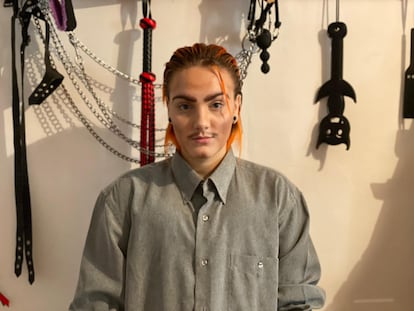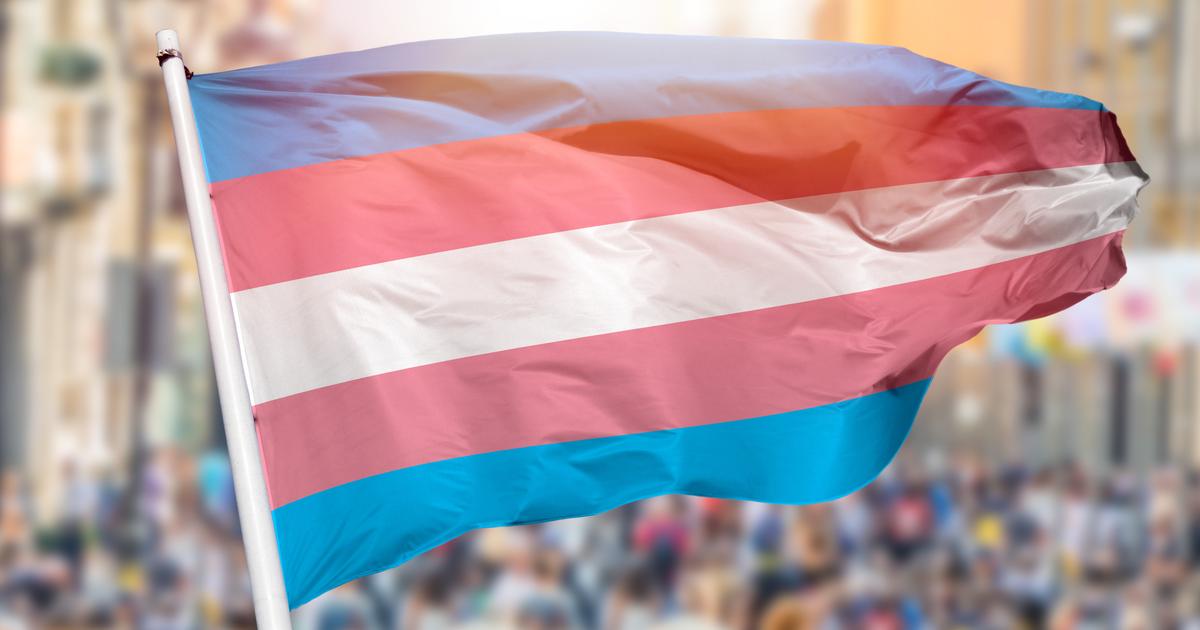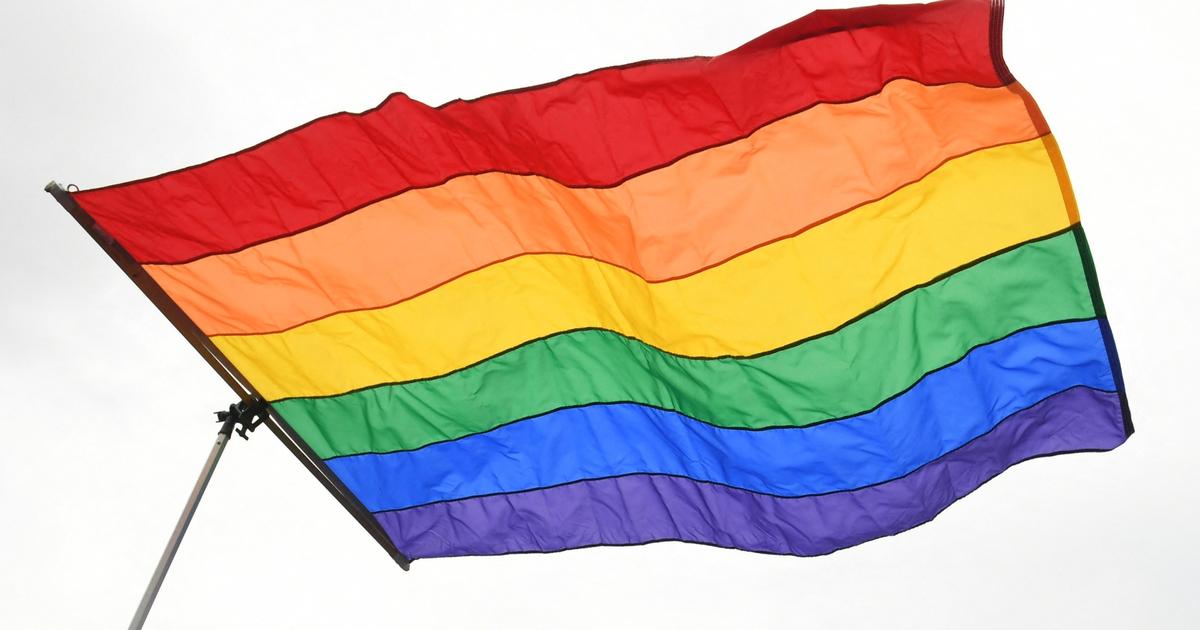Alex Román is 19 years old and has never felt alone as a man. Not a woman either. He confessed it to his family when he was 15 years old, after a childhood full of doubts. His father, Alonso Román, was never a problem: "My son told me through tears and scared to death because he thought I would treat him like a monster." The mother does not accept it and suffers. "He asks me why I can't be a normal person," says the young man, crestfallen. The parent assures that "something natural" should not be given importance and looks with pride at "his child" while he criticizes that they pigeonhole him and asks that they respect his identity: that of a non-binary person, of fluid gender. The Design student explains that his homosexual orientation has nothing to do with his gender identity. He was born with a penis, but he feels himself to be both a woman and a man. It simply says that it flows between the two.“The labels are outdated and they limit us. Why do there have to be feminine things like pink dresses and other masculine things like football? ”He asks wearily.
More information
Lives marked by LGTBIphobia: "I know how I get out of the house, but never how I am going to return"
One in four young people in Spain does not identify 100% with either the female or male category, according to the
Youth in Spain 2020 report
, a social X-ray of those under 30 years of age prepared by the INJUVE Institute.
Alex regrets that the draft
trans law
approved by the Executive does not include the legal recognition of non-binary people and does not allow the gender box on the DNI to be left blank, a possibility that the first draft contemplated but was discarded.
The groups will request their inclusion during the legislative process, with the possibility of leaving the gender box blank on the DNI or including a third section.
This Valladolid man ensures that young people have a more open mind than their elders thanks to social networks: "They serve to meet people similar to you and feel accompanied."
The INJUVE study shows that the internet (46%) is the main channel of information for them.
His 58-year-old father points out that this was not discussed in his time and that culture is key.
Together they watch
Drag Queens shows,
like years before they watched Disney princess movies.
The generation gap exists, they acknowledge, but they learn from each other on a daily basis.
Roman feels lucky: "Many parents still do not accept it."
These are the stories of other non-binary and gender-fluid people.
"I left home for fear that my father would kill me"
Lilo Szewc, 22, residing in Barcelona.
Lilo Swezc knows rejection up close. She just turned 22 and defines herself as transsexual and not binary. She is trans, she explains, but she does not want to transition - that is, to undergo a sex change operation. She does not see herself reflected in the gender assigned to her, but neither does she fully identify with a specific one: "We all have a masculine and feminine part, but we are not educated to consider it." The president of
No Binaries Spain
, Darko Decimavilla, explains that being trans is not making a transition: “That is a possibility but not an obligation. From there, you can be a trans woman, a trans man or a non-binary trans person ”. Lilo agrees: "There is no one way to be trans."
This young Barcelona resident does not remember when she became aware of her identity, but says that when she was little it already bothered her that she couldn't go without a shirt, like her brother: "I didn't want my breasts to grow, I hated them." She also remembers the first complaint she made to her father for assaulting her. He was 18 years old and endured constant beatings and discriminatory comments. His mother just yelled at him and begged him not to tell about those "oddities he felt." The justice acquitted his father because he did not see abuse, simply family quarrels.
Lilo talks about her family with a broken voice and cries when she recounts the decision she made last year: "I left home for fear that my father would kill me." Now she lives alone and is a sex worker. He has post-traumatic stress and does not usually go out: "The street is a war field, I suffer harassment because of my appearance as a woman." He hardly has contact with his parents: "They will never accept me as I am." Lilo insists on the importance of art and clothing as a means of expression: "Dressing and moving as you want is a political act." Lucas Platero, LGTBI activist and researcher at the Department of Social Psychology at the Autonomous University of Barcelona, points out
adultcentrism
of many parents who prevent them from listening to their children: "There is a lack of information and pedagogy, but above all open attitudes to listen to ideas that confront the traditional."
Lilo appreciates the help of a tutor at her institute who spoke with the faculty to expose her situation: "Being listened to is the first step, especially at school."
"There will be no inclusion until the educational program does not include gender and sexuality issues"
Noa Martínez and Quique Suárez, 23 and 20 years old respectively.Facilitated by Noa Martínez
Carlos Martínez and Quique Suárez, aged 23 and 20 respectively, are only called that way on the DNI. For the rest, they are Noa and Joy, a non-binary couple who live in fear of being attacked or insulted for being who they are. "Something as simple as kissing attracts looks and derogatory comments," they say. His parents know nothing of his identity. "The problem is not the age difference, but the lack of pedagogy," slides Noa, who believes that there will be no equality until the entire educational community includes "gender and sexuality issues" in the program. "Social struggles are won in the street and then in Parliament," they conclude.
Noa realized her identity when she attended talks on the subject: “We are not weird for asking ourselves who we are, the strange thing is that most of society never asks about it”.
The psychologist and sexologist Ana Lombardía attributes social intolerance to the lack of pedagogy.
“Sexual orientation is independent of gender identity.
It is important to differentiate orientation, gender and sex, and the ways in which the three variables can be combined in the same person ”.
Lombardy insists that these terms continue to be "diffuse" in the media, in education, health and legislation.
"Real life was not what I saw in town"
Alec López, a young student of Political Science, residing in Salamanca.
Andrea López did not dare to present himself as Alec López, a non-binary, bisexual and polyamorous person, in his town of Zamora, Villalpando (1,400 inhabitants). She is polyamorous, she explains, because she maintains non-monogamous relationships with several people at the same time: "This was unthinkable in my parents' generation." She lived until she was 18 in the town's “squared bubble”, “swallowing” doubts about her identity, until she moved to Salamanca to study Political Science. "The first time I saw two homosexuals kissing was in the city, real life is not what I saw in the town," he says. Alec has always dressed "differently" from others and felt like a drag. "We are more complex than we are socially led to believe," he defends, and gives the example of pangender friends. The term refers to people who can feel of all genders.
These people do not move from one gender identity to another, as in the case of gender fluid, but they identify with different identities simultaneously and fixedly.
Alec prefers not to tell his parents how he feels: “It's not out of fear, it's more out of laziness.
It would take a lot of time for them to understand.
I don't have that energy ”.
The young woman believes that inclusive language helps to normalize and, although she confesses that she does not give special importance to pronouns, she recognizes their importance.
"I am grateful that Minister Irene Montero uses them because it makes diversity visible."
And he concludes: "Living implies deconstructing oneself".
"I worry that my daughter will be discriminated against, but she teaches me that times are changing"
Alía Ramos, 22 years old, law student, and her mother Azucena Juez, in Cantabria. Facilitated by Alía Ramos
Azucena Juez already sensed something before her daughter, Alía Ramos, 22, confessed that she identified as non-binary and lesbian.
Judge, 52, still refers to the young woman as "she", although Ramos uses pronouns with the morpheme
e
(
elles
,
nosotres
...).
She is understanding with her mother: "The generation gap exists, but it is no excuse for not trying to understand the new times."
She highlights that feminism helped her to question and vindicate the diversity of genders and that she considers it essential to have references, as well as to inform herself and express herself on social networks, of which she is very assiduous.
A nervous laugh escapes her mother when she admits that she became suspicious when she read her on Twitter: "My daughter is more radical than I am, it is difficult for me to adapt to this technological world."
The twenty-year-old, a law student in Madrid, points out that the university opened up a new world for her. And Ramos angrily asks: "Why do we have to wait until 18, and sometimes longer, to start living freely our sexuality and identity?"









